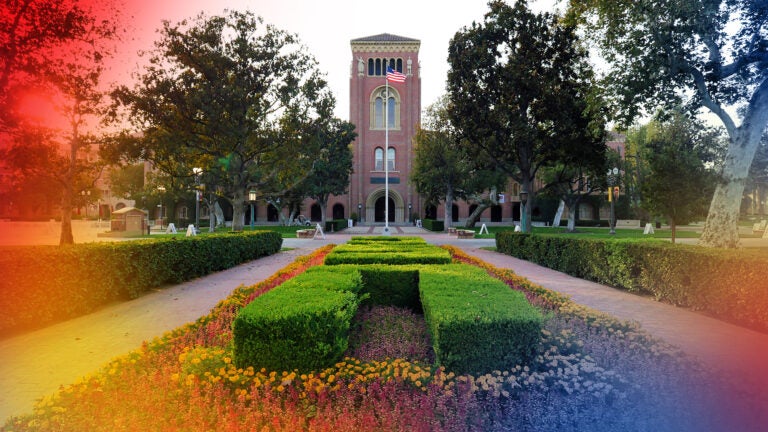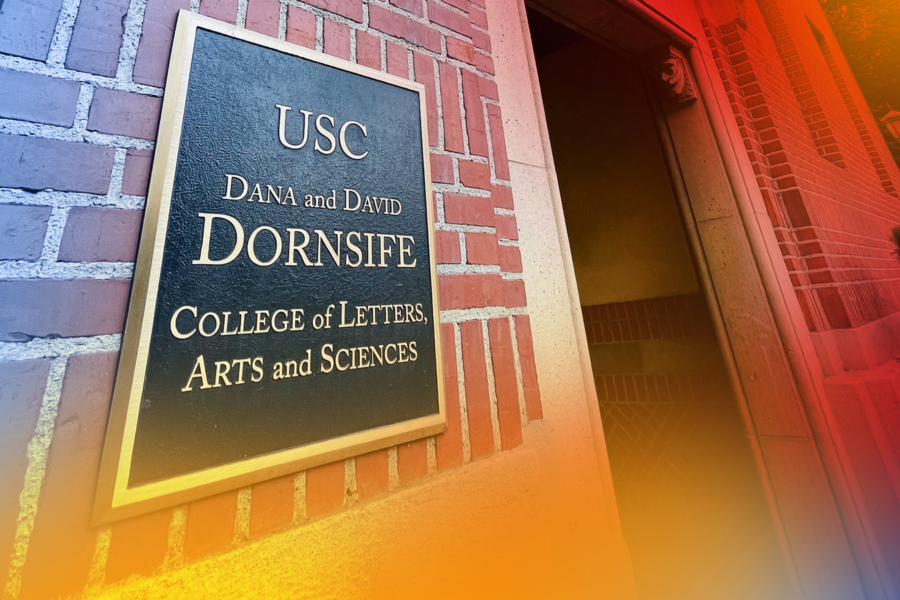
PhD Programs
Push the Boundaries of Knowledge
More than just a personal or professional achievement, obtaining a PhD means adding to humanity’s collective knowledge and expanding the frontier of human understanding.
At USC Dornsife, PhD students delve deep into a subject area, conduct rigorous original research, and use advanced critical thinking and problem-solving skills to uncover new truths about our world. By so doing, they reveal new breakthroughs, add to the tapestry of knowledge in their field, and pave the way for groundbreaking future discoveries. Explore USC Dornsife’s PhD programs below.

USC Dornsife PhD Programs
-
The Art History Ph.D. program puts emphases on the politics of art history; Questions of sexuality and gender in the visual field; Race, ethnicity and the effects of racial inequity on art and its history; The ways in which individual and national identity are constructed in architecture, art and the museum; and the viewer’s stake in representation and the force of subjectivity. Many of the widely renowned faculty members conduct research related to objects and archives that lie beyond the traditional boundaries of art history, whether in terms of fashion, photography, advertising, design, landscape architecture, subcultural imagery, or performance.
-
The Anthropology Ph.D. program trains innovative, rigorous, cutting-edge anthropologists who expand the horizon of the discipline of anthropology in theory, method, form and community engagement. Toward this goal, the PhD program requires serious engagement with social theory and in-depth ethnographic field research, while it also supports new ways of conducting and sharing anthropological knowledge. The program is grounded in a critical engagement with the history, theory and practice of anthropology.
-
The American Studies and Ethnicity Ph.D. program is in a multi-disciplinary department that investigates the multi-faceted problems of race, immigration, urban geography, culture, power, gender, sexuality and social justice. As an innovative and multidisciplinary Ph.D. program, ASE offers models of scholarly inquiry and interpretation that addresses the creative potential of diasporic and ethnic communities and the multi-directional influence they exercise upon the immediate California region, the United States and ricocheting across the Americas, Pacific and Atlantic.
-
The Integrative and Evolutionary Biology Ph.D. program is a multi-domain training program for research on organismic functions across the history of life. Research by IEB faculty and graduate students targets emerging areas at the interface of genomics, evolution and physiology.
-
The Marine Environmental Biology Ph.D. program studies marine organisms, their interactions in complex marine ecosystems and the emergent properties of the communities that result from these interactions. By design and necessity, this work includes studies at all levels of biological organization as well as investigations of the intersection between the activities of organisms and the abiotic world. The interdisciplinary and integrative nature of our research presents opportunities to create unique linkages across scales, educating our students in the connections between molecular biology, physiological ecology, neurobiology and the larger-scale functions of organisms and ecosystems.
-
The Molecular and Computational Biology Ph.D. program includes renowned faculty with expertise in the approaches of molecular biology and genomics. Research interests include prokaryotic regulatory mechanisms and fruit fly aging. The Ph.D. program in molecular biology emphasizes laboratory research, including three different research rotations in the first year.
-
The Ocean Sciences Ph.D. program provides interdisciplinary education and training to prepare professional ocean scientists for careers in academia, industry, and state and federal government. Students develop the ability to identify and solve significant problems in ocean sciences by using their training in several disciplines. They develop the ability to formulate and test hypotheses and integrate information and concepts about how the earth-ocean system is structured and how it functions. Training also is provided to develop skills in oral and written communication of technical and scientific information.
-
The USC Dornsife Department of Quantitative and Computational Biology (QCB) includes renowned faculty with expertise in computational biology, statistical and evolutionary genomics and systems biology. The Ph.D. program in computational biology and bioinformatics emphasizes quantitative analyses and computational methods to address biological problems.
-
The Chemistry Ph.D. program works to provide a high-quality education and research experience for its graduate students and postdoctoral fellows. Graduate students can choose from emerging interdisciplinary fields as well as traditional areas of chemistry. Individual research programs are tailored to suit the needs of each student. Emphasis on emerging areas such as chemical biology, nanoscience, materials chemistry and pharmaceutical chemistry enrich the graduate experience.
-
The Classics Ph.D. program is widely recognized for its distinctive integration of the study of Greek and Latin language and literature into a broader investigation of both the cultural history of the ancient Mediterranean and its impact on successive eras. Our program introduces students to visual, literary and material cultures of antiquity while providing opportunities for the development of individual research specialties from an early stage of study.
-
The Comparative Studies in Literature and Culture Ph.D. program is an innovative graduate adventure that houses the doctoral programs of comparative literature, French and Francophone studies, and Spanish and Latin American studies. Behind its creation was the idea that a Ph.D. education in these fields ought to cultivate a common ground in addition to fostering specialized research. Organized in three distinct tracks (I – Comparative Media and Culture; II – Comparative Literature; III – National Literatures and Cultures) that share a core curriculum, CSLC emphasizes cross-disciplinary perspectives as well as rigorous training in cultural and linguistic traditions.
-
The Earth Sciences Ph.D. program focuses on understanding the processes that influence the tectonics and environment of the planet, on using this understanding to read the record of earth history written in rocks and sediments and on developing models that can be used to predict future changes due to natural phenomena and anthropogenic influences. Issues of societal concern related to seismic risk, climate change, environmental contamination and other geologic hazards play an important role.
-
The East Asian Languages and Cultures Ph.D. Program emphasizes interdisciplinary and innovative research. The program provides students with systematic training in East Asian languages, literatures and cultures, with special strengths in visual culture and gender studies. Faculty members also are committed to intraregional and interdisciplinary studies of East Asia, which includes critical interaction among the cultures of China, Japan and Korea, and integration of modern and pre-modern studies.
-
The Economics Ph.D. program is widely known for economic theory and econometrics, development economics and game theory. Regional expertise focuses on Japan, East Asia, the Middle East and Latin America. Recent additions to the faculty have deepened the department’s expertise in economic demography, health and labor, while new connections with USC’s other centers of economic research — in policy and planning, health care, business and finance — provide extraordinary opportunities for applied research.
-
The English Literature Ph.D. program finds its intellectual coherence in a variety of interests that overlap periods and fields. Literary history is vital to our endeavors, filtered through a series of shared rubrics and strengths that include, but are not limited to: Poetry and poetics; Gender and sexuality; Media, film and popular culture; Study of popular culture; Studies in race and minority literatures; and Narrative studies.
-
The English Creative Writing and Literature Ph.D. program offers a series of writing workshops taught by our internationally renowned creative writing faculty and graduate literature seminars with their cohorts in the literature track. Working together as scholars, students in both tracks find the collaboration a remarkably fruitful, mutually inspiring, and indeed unique aspect of the program.
-
The History Ph.D. program offers a rigorous course of study that balances depth in particular fields with a broad, transnational, and interdisciplinary perspective. The program trains students in historical methods, research, critical analysis of written and visual sources, historical writing, and historical pedagogy through intensive reading courses, seminars, and tutorials. This training culminates in the Ph.D. dissertation, a significant scholarly and historiographical contribution to the study of a field.
-
The Linguistics Ph.D. program enjoys a national and international reputation for excellence. Research areas represented in the department include syntax, phonology, phonetics, semantics, morphology, sociolinguistics, first- and second-language acquisition, language processing, and language change.
-
The Linguistics Ph.D. program enjoys a national and international reputation for excellence. Students interested in East Asian linguistics take the Doctor of Philosophy in Linguistics with a specialization in East Asian linguistics.
Research areas represented in the department include syntax, phonology, phonetics, semantics, morphology, sociolinguistics, first- and second-language acquisition, language processing, and language change.
-
The USC Dornsife Department of Mathematics is home to many mathematical theoreticians as well as specialists in applications of engineering, computer science, finance, economics, physics, and computational genomics. Faculty expertise in both theoretical and applied fields gives the department’s research a unique breadth.
-
The USC Dornsife Applied Mathematics Ph.D. program is home to many mathematical theoreticians as well as specialists in applications of engineering, computer science, finance, economics, physics, and computational genomics. Faculty expertise in both theoretical and applied fields give the department’s research a unique breadth.
-
The Philosophy Ph.D. program provides for a wide range of study within the analytic tradition in philosophy, both classical and modern, and in metaphysics, philosophy of mind, philosophy of language, epistemology, ethics, political philosophy and logic.
-
The Physics and Astronomy Ph.D. program observes the most elemental forms of nature and how they behave in both inner and outer space. From electrons to galaxies, faculty scientists explore the structure of matter and how it organizes itself. Encompassing both the smallest and the largest objects in the universe, the faculty’s research interests are necessarily broad, ranging from atomic physics, elementary particle theory, quantum optics and laser physics to solar systems, self-organizing systems and stellar structure.
-
The Physical Biology Ph.D. program integrates biophysical research experience leading to a dissertation with state-of-the art curriculum that (i) introduces molecular and cell biology to quantitatively minded students; (ii) presents a rigorous treatment of the physical principles underlying biological phenomena; and (iii) emphasizes the emerging physical methods that has transformed the biological sciences into a quantitative discipline. While distinct in its intellectual focus from existing graduate programs at USC, this program harnesses the critical mass of research-active biophysicists in multiple departments (physics, biological sciences, chemistry, multiple engineering departments, and the Keck School of Medicine of USC.
-
The Political Science and International Relations Ph.D. program features a combination of standard and innovative fields of specialization and is especially strong in: Political communication; Law and public policy; International political economy; East Asia; Latin America; Foreign policy analysis; Race and ethnicity; and Culture, gender and global society. Students may also petition to create their own special fields.
-
In this innovative, interdisciplinary doctoral program, faculty from the USC Dornsife Department of Sociology, the USC Dornsife Spatial Sciences Institute and the Department of Preventive Medicine at Keck School of Medicine of USC provide training for careers in research and teaching as well as applied work in sociology (population), preventive medicine (health) and the spatial sciences (place). Students complete two research rotations as well as courses in biostatistics, demography, epidemiology and spatial sciences, with additional course work required according to specialty area and/or dissertation.
-
The Psychology Ph.D. program provides students with access to an exciting range of research and classroom experiences. The faculty currently investigates topics related to aggression, prejudice, substance abuse, social relationships, psychological disorders, psychotherapy, motivation, cognitive and social development, language acquisition, measurement and assessment, qualitative methods of cognitive processes, memory, learning, perception, behavior genetics, biological bases of behavior and neuroscience.
-
The Religion Ph.D. program offers instruction in methods and theories for the study of diverse religions as well as specialized training in one of three areas of study: Asia Pacific religions, comparative Christianities, global Islam. In addition to instruction within the Department of Religion, the program promotes interdisciplinary study in related disciplines. Students may also take advantage of faculty’s participation in many research centers and institutes at the university that sponsor lectures, seminars and fellowships.
-
The Slavic Languages and Literatures Ph.D. program is designed to prepare students for a career in teaching and scholarship at the university level. It provides a thorough grounding in Russian literary and cultural history as well as in the theoretical perspectives current in the field. Elective coursework, particularly taken at the upper level, allows students to take advantage of the department’s expertise in such additional areas as Russian art, Russian theater and Eastern European cinema. The linguistic component of the curriculum together with the experience as a teaching assistant in Russian language courses that many students gain also serves as preparation for positions involving language teaching.
-
The Sociology Ph.D. program has a proud history and a wide range of research and teaching interests and methodological approaches. The faculty includes some of the nation’s leading sociologists in the study of families, culture, religion, immigration, race/ethnicity, and gender. Specializations include race, gender, families, culture and immigration, but students may also craft emphases in demography, religion, sociology of the life course and aging, organizations, work and social change, medical sociology, urban sociology, and class stratification.
Apply Now to USC Graduate School
Your next step as a scholar is within in reach. Apply now to our graduate programs to commence your PhD program.

Contact Us
USC Dornsife Office of Graduate and Professional Education
3551 Trousdale Pkwy., ADM 304
Los Angeles, CA 90089-4012